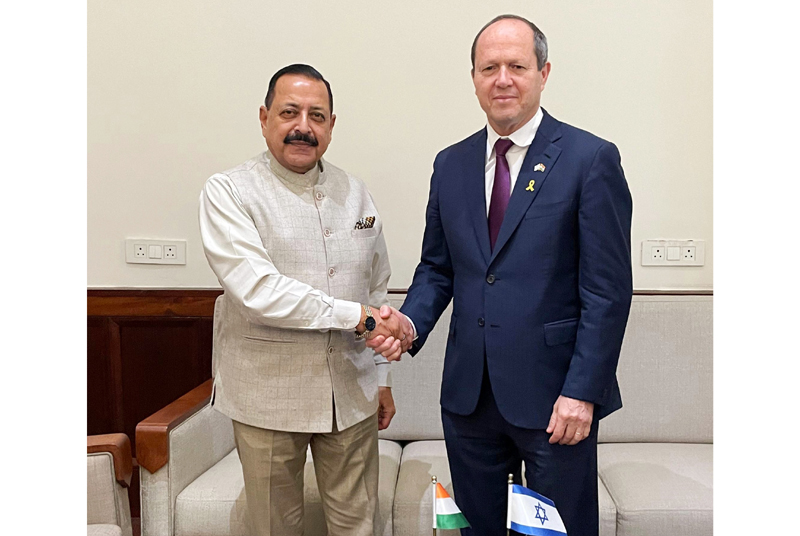Excelsior Correspondent
NEW DELHI, Dec 3: During his visit to India, Israel’s Industry & Economy Minister Nir Barkat held discussions with Dr. Jitendra Singh, the Union Minister of State for Science and Technology, among other key portfolios.
The two leaders explored opportunities for collaboration in startups, focusing particularly on Space and Quantum Technology. They also exchanged ideas on innovation initiatives in the agriculture and healthcare sectors.
Accompanied by a senior delegation, Minister Barkat engaged in a productive dialogue with Dr. Singh, who highlighted the transformative vision of India’s National Quantum Mission as pivotal to the nation’s tech advancements. He invited Israeli startups, renowned in quantum computing, to join forces with Indian institutions to develop essential quantum technologies. “India and Israel can enhance each other’s capabilities, with India’s vast market and manpower complementing Israel’s cutting-edge innovations,” he stated.
Dr. Singh noted the remarkable expansion of India’s space ecosystem, crediting the government’s proactive policies for the surge in space startups. Since liberalizing the sector to private enterprises, India has increasingly established itself as a global hub for space technology. “Israeli space startups stand to gain significantly from partnerships with Indian companies,” he remarked, emphasizing the synergistic advantages of combining Israel’s innovative strengths with India’s cost-effective production and large talent base.
He introduced the concept of PPP+PPP, or Public-Private Partnership with a Proactive Policy Push, describing it as a unique model that has spurred economic growth and innovation in India. Dr. Singh proposed that both nations utilize this framework to expand joint ventures in vital and emerging technologies. He expressed confidence that integrating India’s scale in markets and workforce with Israel’s innovative capabilities could yield significant benefits.
The ministers also examined cooperation in the fields of semiconductors, artificial intelligence (AI), and the Internet of Things (IoT). Dr. Singh encouraged Israeli firms to see India as a trustworthy ally in these critical areas, highlighting the country’s achievements in indigenous technology, including mobile manufacturing and advancements in 5G.
Minister Barkat conveyed his deep appreciation for India’s steadfast support, noting Prime Minister Narendra Modi’s quick solidarity during critical times. He shared insights on Israel’s innovative economic model, which outlines six key clusters driving exports, such as advanced manufacturing and life sciences. This model aligns infrastructure with these clusters, providing specialized facilities like labs for various startups. For example, shared laboratories for agri-tech ventures not only minimize expenses but also promote a collaborative environment. By harnessing public-private partnerships, Israel enhances efficiency and facilitates the scaling of innovations, presenting a replicable framework for India-Israel collaboration.
Both ministers agreed to commence collaborative endeavors in the agriculture and marine industries, recognizing their potential for mutual growth. They proposed the establishment of a dedicated working group to conduct a thorough analysis of these sectors to identify opportunities for innovation and sustainable development.
Dr. Singh concluded by stressing the shared ambitions of India and Israel as knowledge-driven economies. He reiterated that partnerships in sectors such as space, quantum computing, and biotechnology would not only reinforce bilateral relations but also position both countries as frontrunners in global innovation. “Together, we can leverage our strengths to tackle today’s challenges and create solutions for a brighter future,” he asserted.


Leave a Reply